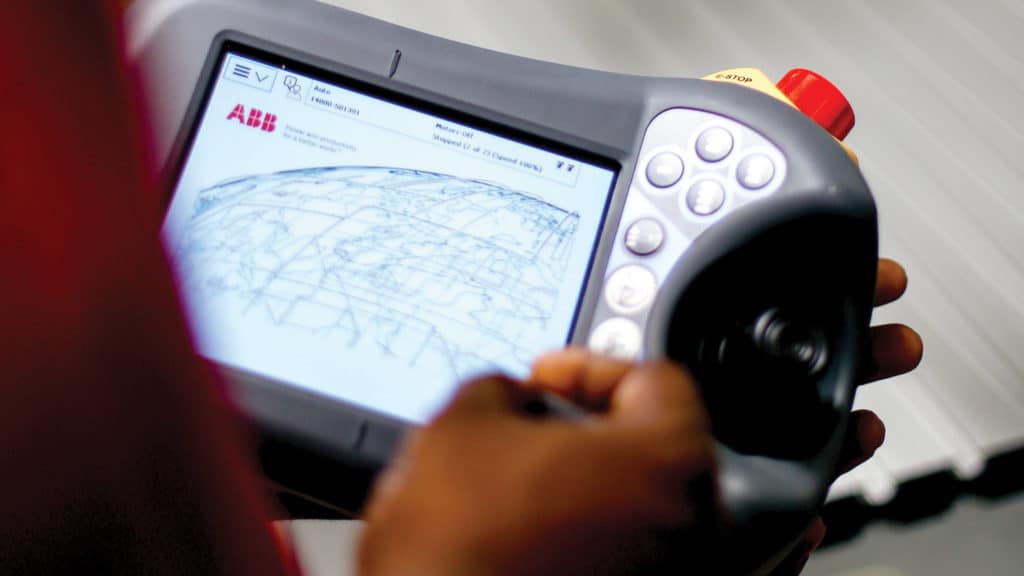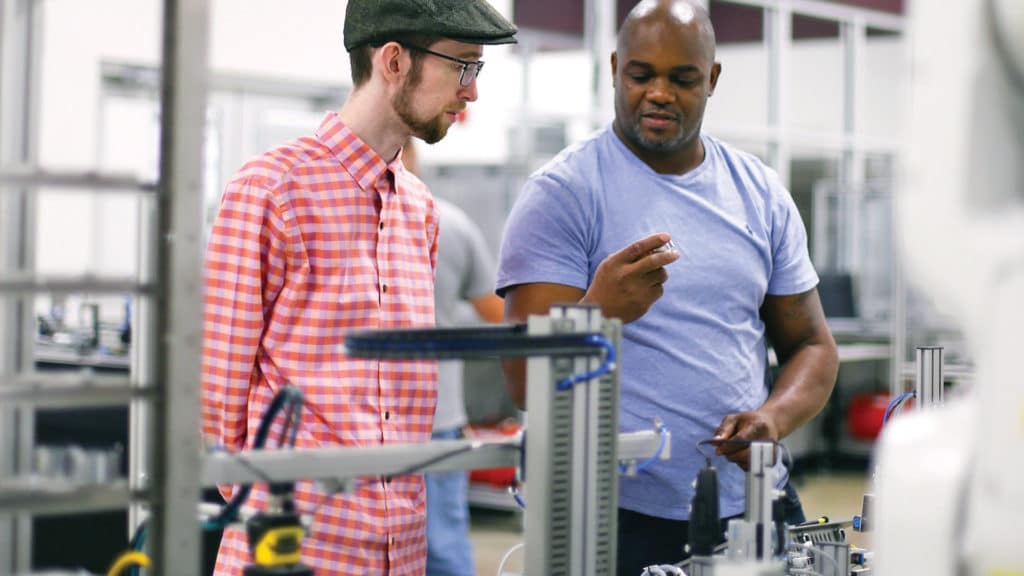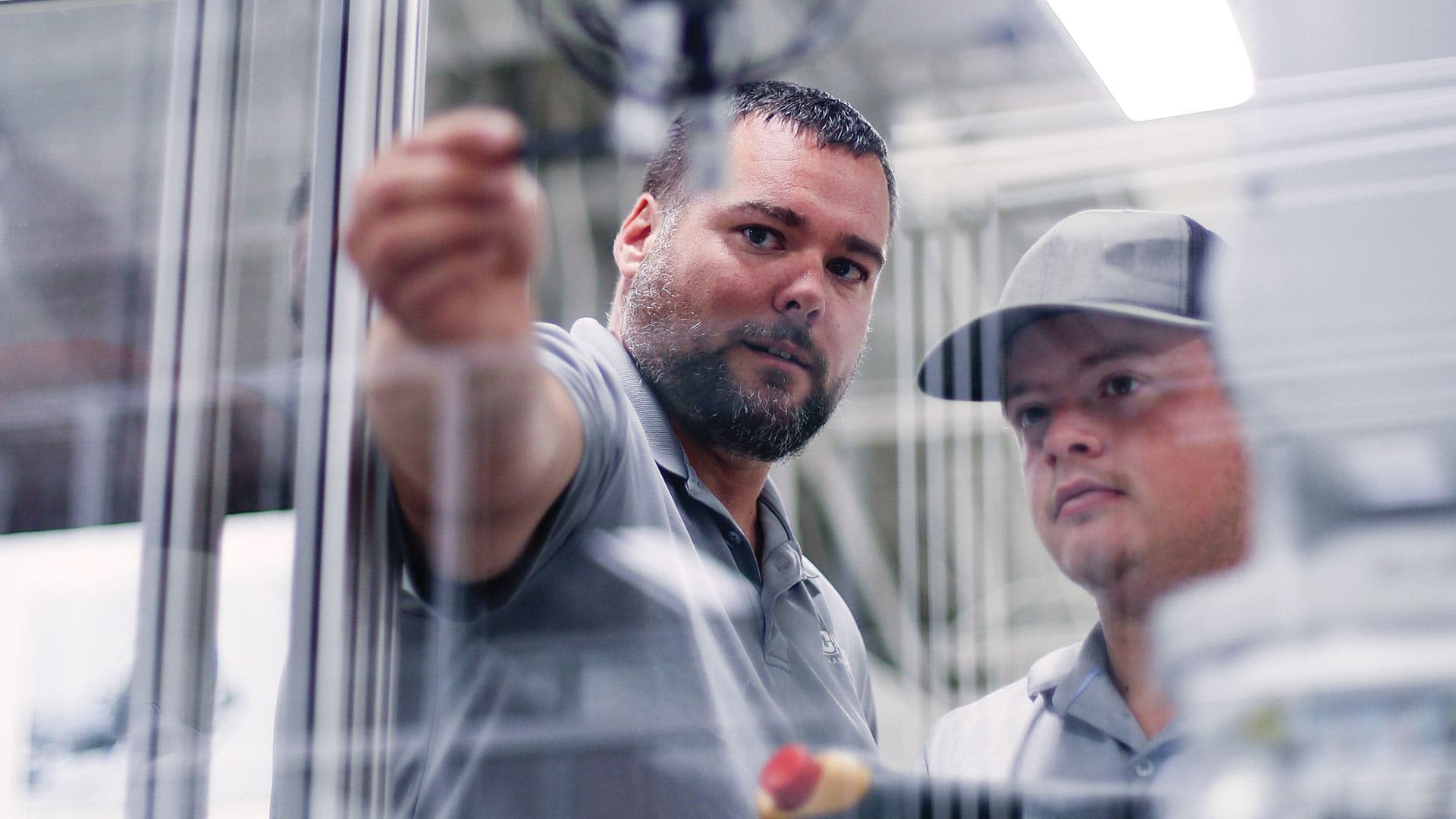Pictured above: David Roberts, left, and student Blake Taylor, on the equipment in the Rankin Campus Career-Technical Education Building.
The college unveiled the newly renovated and expanded building in June. It has labs in electromechanical technology and automation that give students in Electromechanical Technology, Robotics, Industrial Maintenance, Electrical, Welding and Mechatronics in an extra 4,930 square feet of new space in which to learn the kinds of skills employers want. Expansion of the building involved closing in and renovating previously unused space in the rear of the property. Funding sources on the project included additional property tax dedications via the Rankin County Board of Supervisors, totaling $800,000 in each of the next two years. “The Rankin County Board of Supervisors considers itself in a strong, mutually beneficial partnership with Hinds Community College,” said Steve Gaines, president of the Rankin County Board of Supervisors. “Because we understand how important it is to have a well-educated, well-trained and well-rounded workforce for Rankin County.”
Taylor and his classmates and instructors agree support from local government and the business community is paramount to the lab’s success. “It’s extremely important that it continues,” Taylor said. “We couldn’t do a lot in a little-bitty classroom. The added equipment helps us expand our ideas and use what’s out there in the workforce.” David Roberts, an instructor in the program and himself a former career-tech student at Hinds, simply looks to hiring trends by the state’s biggest employers in manufacturing to promote the importance of continued funding. “Continued support of the Rankin CTE lab at Hinds is important because of the businesses coming into town,” Roberts said. “Just look at Continental Tire and Unified Brands. They’re hiring technicians as soon as students graduate. Some companies are hiring interns prior to graduation because they know our program will produce qualified technicians.

“Industries in our district are choosing to expand and new industries are relocating here because they know that the College can deliver a highly skilled, highly qualified workforce,” he said. “Our program’s enrollment is increasing so much that we had to hire a second instructor for this fall semester.” Another financing piece to complete the renovation was a $1.2 million Challenge Grant from the Mississippi Community College Board.
“It will give us so much more opportunity to offer advanced training programs to area business and industry and it will allow us to better connect employers with qualified workers,” said Dr. Robin Parker, Dean of Career and Technical Education at the Rankin Campus. Those opportunities also extend to older students wanting to expand their skills and land higher-paying jobs to support their families in the process. On a scale of 1 to 10, “I’d say my skill level is only a three right now,” said Calvin Johnson, 43, a Port Gibson native now living in Brandon.
He has worked various maintenance jobs for years and has a welding credential from Hinds, but hopes to grow his chances of challenging employment with successful completion of the Industrial Maintenance program. “I’m in the program to learn the latest technology and further my career,” he said. “Here, I’m getting a better understanding of PLC (programmable logic controllers) and electrical work, control motors and related things.”
The Rankin Career-Technical Education building itself has housed career-tech classes since 2009, after the college purchased it the year before. Additional programs offered there include electrical, welding, plumbing, Associate Degree Nursing and practical nursing. Built in 2002, the two-story, 40,000 square-foot building sits on five acres about five miles from the main Rankin Campus off Highway 80. The availability for training of futuristic robotic arms and machines used to program today’s manufacturing assembly lines will also help recruit businesses to Rankin.

“Hinds is such a wonderful partner for us in terms of workforce development and training needs,” said Regina Todd, associate director of Rankin First, the county’s economic development arm. “It’s especially the case when we’re trying to recruit new industries to the county. We’re hoping we can bring prospective new employers through this new mechatronics lab and see firsthand what kind of equipment Hinds is training students on.” Students in Roberts’ class have sensed the shift in today’s manufacturing plants to a more diverse set of skills to work in them.
“A lot of the traditional manufacturing jobs are slowly disappearing, so we need to continue transitioning into that higher-skill workforce,” said Harrison Lanum, 20, of Brandon “You’re not making the parts anymore, but instead you’re overseeing, repairing and programming the robot that makes them.” To students in the program at any age, there’s no such thing as too many career opportunities. “I just want the ability to work with my hands,” said Darrell Hill, 25, of Brandon, who has experience at Nissan as an assembly line technician. He wants to grow those skills at Rankin. “I wanted to learn more skills than just working on the line,” he said. “With the expansion and support, there will be more job opportunities and knowledge a student can receive.”
